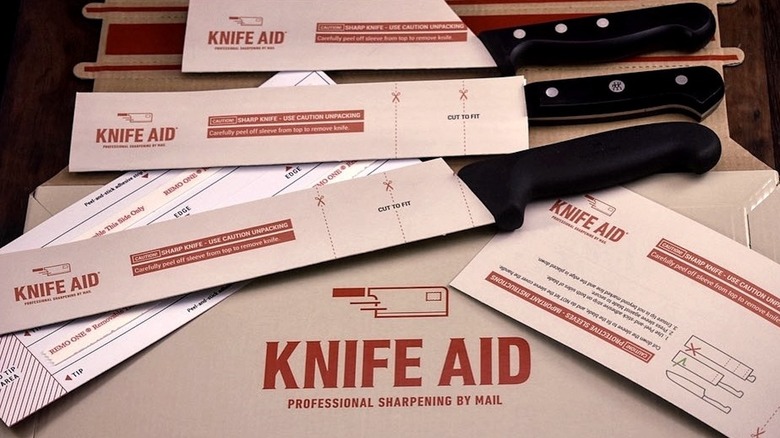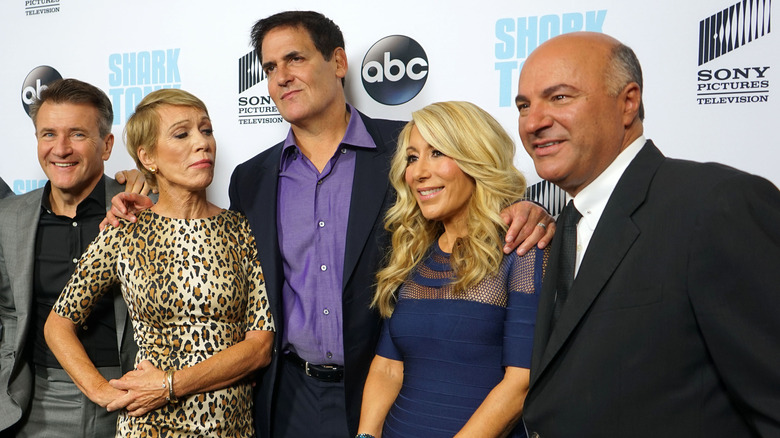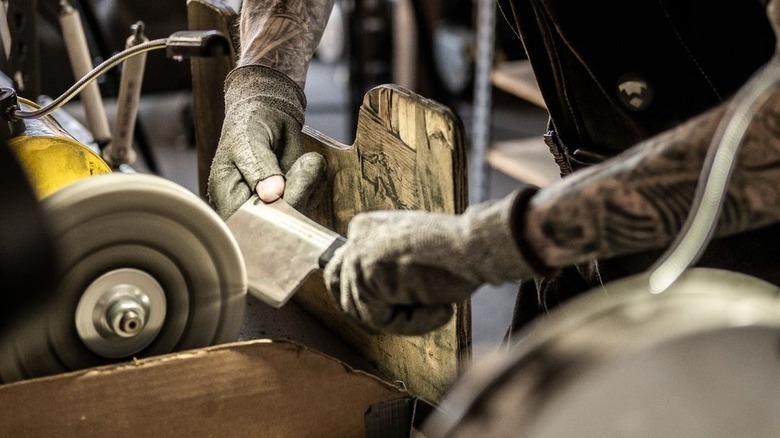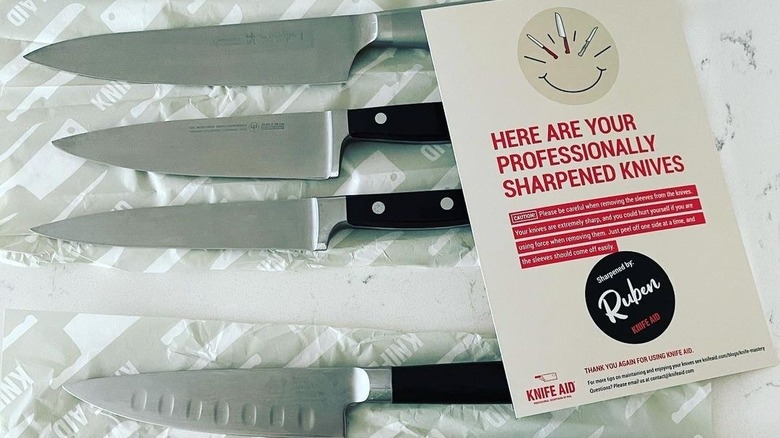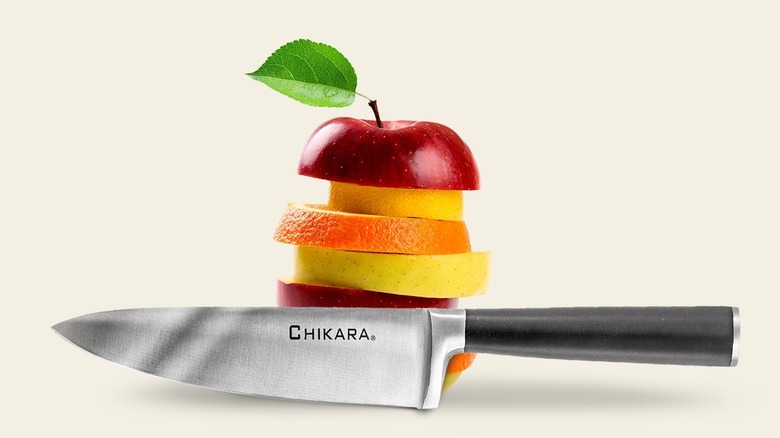Knife Aid: Here's What Happened After Shark Tank
Few "Shark Tank" appearances have been more memorable than that of Swedish entrepreneurs Mikael Soderlindh and Marc Lickfett. The duo generated so much enthusiasm with their pitch for their company Knife Aid during Episode 4 of Season 11, that all but one of the sharks followed them into the hallway to try to make a deal, something that had previously never happened in the history of the show.
What was the pitch that generated such a feeding frenzy among the billionaire investors on the hit ABC show? To become part of the team for their mail-in knife sharpening service, basically a more convenient version of a business model that has long existed. The two Swedes sought a $400,000 investment for 15% ownership of the company, which, at that time, was a recent startup that had already garnered six figures in sales.
To back up their pitch, both entrepreneurs boasted a past history of startup success. Soderlindh, in fact, had co-founded the company Happy Socks back in 2008, and that brand's successful reputation left a positive impression on the sharks, who in this 2019 episode consisted of real estate mogul Barbara Corcoran, Dallas Mavericks owner Mark Cuban, inventor and investor Lori Greiner, software tycoon Kevin O'Leary, and brand builder Rohan Oza.
What happened to Knife Aid on 'Shark Tank'?
Who doesn't love a pitch that has a shark — Kevin O'Leary, in this case — slicing a pineapple in half with a sharp knife? The answer, apparently, is Mark Cuban, who proved to be the lone holdout on the panel. Not only did he refuse to make an offer for a stake in Knife Aid, or follow founders Mikael Soderlindh and Marc Lickfett into the hallway for last-minute negotiations, Cuban also berated his fellow sharks for their hyper enthusiasm, which he likened to groveling. "I'm a (expletive) shark," Cuban said, to explain his refusal to run after the pair.
The other four sharks were all-in on the pitch, of course, although Rohan Oza initially had questions about why the two entrepreneurs needed funding help in the first place, given their past business successes (in addition to Soderlindh's association with Happy Socks, Lickfett logged time with U.K. art print company King & McGraw). The answer, they said, was their inexperience and lack of knowledge regarding the U.S. market. The Swedes said they planned to move to the U.S. to help grow the company.
What followed was an unprecedented bidding war that spilled out into the hallway, with all the sharks except Cuban bidding to get an ownership stake. Lori Greiner and Oza teamed up on what proved to be the winning offer: $500,000 for a 20% share in Knife Aid.
Is Knife Aid still in business?
Years after its famed "Shark Tank" episode aired in October 2019, Knife Aid is still open, and is still providing professional knife sharpening services — customers simply send in their cutlery via the mail and are shipped back their kitchen tools freshly-sharpened. Not only has the company established itself in the U.S. market, as entrepreneurs Mikael Soderlindh and Marc Lickfett claimed was the goal during their "Shark Tank" appearance, but Knife Aid now has two workshops in the U.S. located in Agoura Hills, California, and Pleasantville, New York.
These brick-and-mortar locations handle the mail-in processing, as well as sharpening and repairs, but only the Agoura Hills location also offers the services for walk-in customers. The way the business works today is largely the way the two entrepreneurs envisioned it when they were making their pitch to the Sharks. Knife Aid mails an envelope to customers, in which they enclose and send in their knives (the minimum order is four pieces) to be sharpened. The contents are insured, and the formerly dull pieces are returned to customers in razor-sharp condition, typically within one week.
What's notable, however, is that the deal made on "Shark Tank" apparently wasn't finalized, and Soderlindh and Lickfett had to source additional funding, which they reportedly received from other venture capitalists.
What has happened to Knife Aid since Shark Tank?
Not everything about the business has followed the original pitch. One of the possibilities Mikael Sonderlindh discussed during Knife Aid's "Shark Tank" appearance was having its services available through retail stores. During the segment, Mark Cuban suggested that these services could be available at Williams-Sonoma locations, for example, throwing out the idea that the retailer would get 25% for facilitating sales. That aspect has not come to fruition, however, as Knife Aid remains almost exclusively a mail-in business.
How successful has Knife Aid become since the "Shark Tank" episode aired? It has seemingly done well, although Soderlindh ended his association with the company in December 2021. Despite the exit of this founder, Knife Aid generated $2 million in annual revenue by 2024, a shocking growth only six years after its "Shark Tank" debut. Knife Aid and culinary supplier Zwilling seem to have formed a partnership of sorts, with Zwilling now offering Knife Aid sharpening services directly from its website, and Marc Lickfett working as its VP of Digital Transformation since March 2022 and ending his tenure as Knife Aid's CEO in May 2024. Though it's unclear how involved the two companies are, partnering or selling to such an established purveyor of high-quality kitchen equipment is certainly a smart move on Knife Aid's part, giving it even more reach after securing two separate U.S. locations.
The future of Knife Aid
Reviews of Knife Aid's services haven't always been as on-point as the founders' "Shark Tank" pitch. A review of the company's work from Wired noted some uneven quality, and Knife Aid's customer review rating on Amazon is only 2.5 out of 5 stars. However, the feedback on Facebook is stronger (86% recommended with 431 reviews), and testimonials on the company's website rave about the service. Additionally, the company's sales have been good, and the array of services has grown from the original "Shark Tank" pitch.
For example, Knife Aid now repairs scissors, too, and it doesn't just offer one-time-only knife sharpening and repair services. It also offers subscriptions so that customers can have their utensils sharpened on a regular basis — whether that's every three months, every six months, or every year. Gift cards are now available, too, for those who want to give a nice surprise to those who love to cook. So, even though the initial "Shark Tank" deal seemingly fell through, the company has generated enough buzz and customers to stay open while continuing to grow its services.

